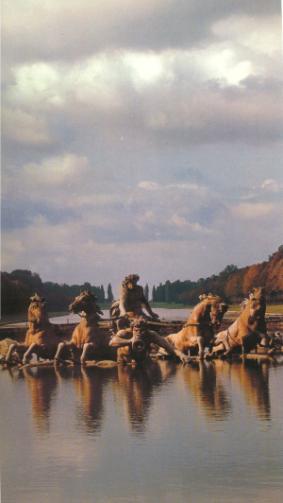|

|
Transl. Christian Souchon 01.01.2005 (c) (r) All rights reserved |
|

|
Transl. Christian Souchon 01.01.2005 (c) (r) All rights reserved |
Il est intéressant de comparer ce poème de la maturité avec l'oeuvre de jeunesse traitant du même sujet.
Comme dans le poème en vers à onze pieds Ludovicus Magnus le sujet est l'inanité du rêve de toute-puissance du monarque. On remarque dans les deux poèmes le même travail sur la forme (les rimes internes et allitérations- dans "Ludovicus": "tORd"/ "esSOR", "tumulTUEUX"/ "nUIT", "MUselais/ "tuMUlte", "SOLeil éCLAT"/"MArbre CLOS", "ENSevelit"/puissANCE"; dans "Grand canal": "comPOSent"/ "MUSique"; "entreLACa" / "nASse"; "FoRce"/ "ReFus", "SuPpoRtait"/ "SPlendeuR"/ "SuRPasse", "BRASier"/ "BRonze"/ "marBRE", "CHamp de CHair"...), des homonymes parfaits: "fonde' et "se fonde", des mots qui se répondent en miroirs: "FoRce" et "ReFus"...). L'idée centrale est cependant différente: le marbre qui fige a fait place ici à l'espace organisé entre jardin et palais pour capturer l'éclat du soleil- symbole. Mais "la pierre ensevelit la puissance" du roi soleil.
It is worth while comparing this poem by a man at the height of his powers with his early work on the same topic.
As in the eleven-foot verse poem Ludovicus Magnus the subject is the futility of the monarch's dream of omnipotence. Both poems feature the same work on form (internal rhymes and alliterations - in "Ludovicus": "tORd"/ "esSOR", "tumulTUEUX"/ "nUIT", "MUselais/ "tuMUlte", "SOLeil éCLAT"/"MArbre CLOS", "ENSevelit"/puissANCE"; in "Grand canal": "comPOSent"/ "MUSique"; "entreLACa" / "nASse"; "FoRce"/ "ReFus", "SuPpoRtait"/ "SPlendeuR"/ "SuRPasse", "BRASier", "BRonze", "marBRE", "CHamp de CHair"), perfect homonyms: "fonde' and "se fonde", words that echo each other loke mirrors: "FoRce" and "ReFus"...). The central idea is however different: the freezing marble gives here way to space devised, from garden prospect to palace, to capture the brilliance of the sun - which has become a symbol. But "the stone buries the power" of the Sun King.
Listen to "Grand Canal" in English